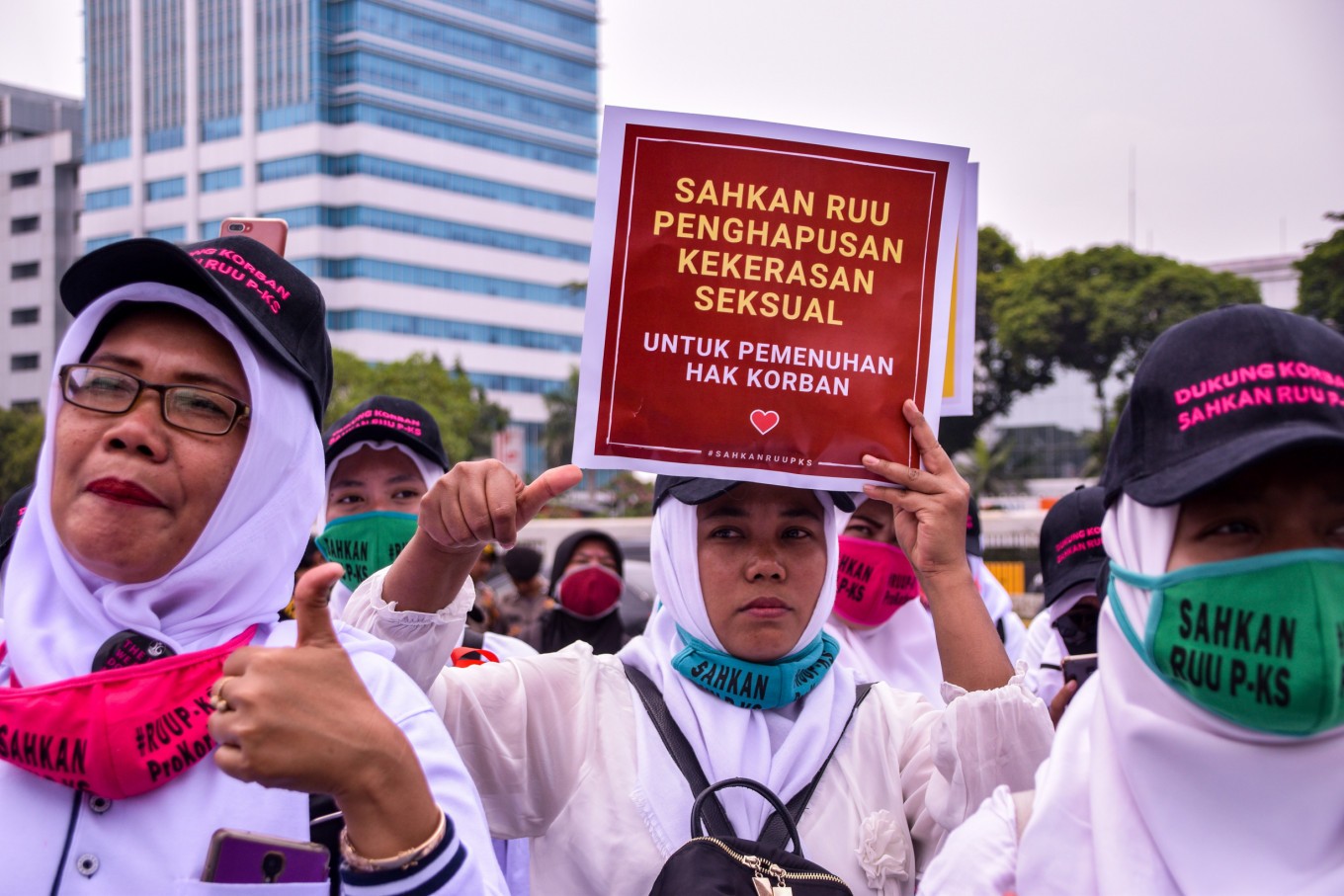Popular Reads
Top Results
Can't find what you're looking for?
View all search resultsPopular Reads
Top Results
Can't find what you're looking for?
View all search resultsVictims of campus sexual abuse seek justice, online support
Survivors of sexual abuse or their friends, most of whom are female university students, have stood up and used online platforms to share their stories with the public, hoping to find justice and support.
Change text size
Gift Premium Articles
to Anyone
T
he global #MeToo movement has swept through Indonesia’s higher education system, with victims of sexual abuse and harassment, one by one, speaking up and seeking help and justice over the past two years. However, a lack of safe spaces, both on campuses and in the legal system, has forced these young people to take the avenue most accessible to them: social media.
Over the past few weeks, social media has been dominated by discussions and stories of alleged sexual abuses on several campuses across Indonesia. Survivors of sexual abuse or their friends, most of whom are female university students, have stood up and used online platforms to share their stories with the public, hoping to find justice and support.
And although their decision to share their stories publicly could put them at risk, women’s right activists have said many survivors see it as their only way to find support and justice when universities and law enforcement bodies are often reluctant to take up their cases.
In response, several public webinars have been held to discuss the issue of sexual abuse on campuses. In one recent webinar, Indonesian Legal Aid Institute (YLBHI) chairwoman Asfinawati said awareness about sexual abuse issues and the cases that have been made public in recent years have encouraged other survivors to speak up.
“There are not many options for survivors. There are no laws and regulations, and our law enforcement bodies still have a lot to learn about how to handle cases of sexual abuse on campuses,” Asfinawati said on May 7.
The absence of regulations, the reluctance of rectors to take such cases seriously and unequal power relations, Asfinawati said, had made it difficult for survivors of sexual abuse on campus to seek justice and support, meaning that cases continue to occur with most going unreported.
The collaborative project #NamaBaikKampus (CampusReputation), initiated in 2019 by The Jakarta Post, Tirto.id and VICE Indonesia received reports of 174 cases of alleged sexual harassment. Of the 174 survivors who shared their stories, 87 said they never reported the harassment to authorities.
One of the most recently reported cases involved Ibrahim Malik, a recipient of an Australian government scholarship, who has been accused of sexually harassing and abusing at least 30 female students from the Indonesian Islamic University (UII) and the University of Melbourne, where he is currently pursuing his master’s degree.
Read also: Pressure mounts for Australia to cancel scholarship of student accused of sexual abuse
The women have accused him of a range of abuses — from verbal harassment to physically forcing them into sexual acts — since 2016 until this year, Yogyakarta Legal Aid Institute (LBH Yogyakarta) reported. He allegedly continued these actions while studying in Australia on an Australia Awards scholarship.
Sabiq Muhammad, a member of UII Bergerak, a student alliance at UII, that was formed to support victims of sexual abuse, said that Ibrahim, who was popular among students and known for his religious image and record of academic achievement, had received protection and support from various groups.
Before the cases became public in early May, Ibrahim had been invited to be a key speaker at several seminars.
“UII still doesn’t have a specific regulation on sexual harassment cases. This makes survivors reluctant to report the harassment they have experienced. Since the beginning, UII has not been serious about handling this case. The university formed a team to resolve the case, but it is really closed-off, and we don’t know what its stance is on protecting the survivors,” Sabiq told the Post recently.
The Education and Culture Ministry also does not have a regulation for handling cases of sexual abuse on campuses and continues to ask universities to do so on their own.
Although several student bodies and organizations on campuses have tried to formulate a regulation that could help victims of sexual violence on campus, no universities have implemented an official regulation on sexual abuse except for Gadjah Mada University (UGM).
Read also: UGM officials criticize rectorate's huge revisions to sexual violence regulation
UGM is among the few universities in Indonesia that have set up a team tasked with drafting a comprehensive rector’s regulation for the prevention of sexual abuse. The team was formed following a case that gained nationwide attention in 2018 known as the “Agni case”.
UGM’s chairperson of the drafting team, Muhadjir Darwin, said the draft of the regulation had been approved by the rector on Jan. 24. However, it is yet to be implemented.
“When I asked them in March, the rector said they were making plans for the implementation. But then COVID-19 happened and we went into lockdown. We have to keep pushing them to implement it once the academic year begins,” Muhadjir said during a webinar on May 15.
Sabiq from UII Bergerak expressed hoped the government, via the Education and Culture Ministry, would pay serious attention to the way campuses handled sexual harassment cases and use it as a key indicator in evaluating universities’ accreditation.
The Education and Culture Ministry’s higher education director general, Nizam, said the ministry had formed a team to draft the regulation so that all universities could have the same regulations for addressing sexual abuse on campuses.
“The regulation will be ready in the near future. We have formulated programs and regulations to make campuses safe, healthy and friendly environments,” he said.










